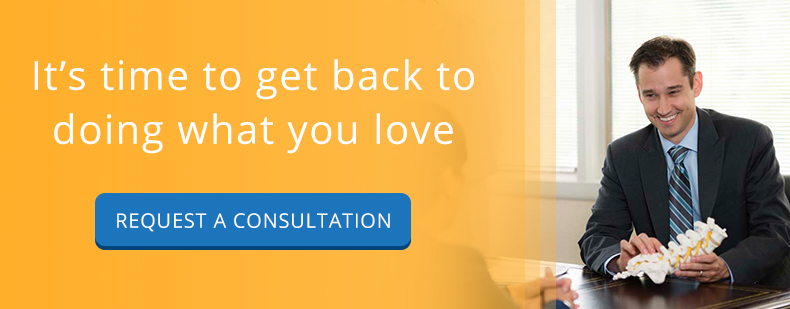Are you experiencing the pain of a herniated disc? Would you know if you are?
While herniated discs may share many symptoms with other injuries and conditions, it’s important to get a proper diagnosis and subsequent treatment. Read on to learn more about the symptoms you may experience with the presence of a herniated disc and how to find the most effective herniated disc treatment in NJ.
Your back is made up of a series of bones known as vertebrae. These vertebrae stack together to create your spine. In between each of these bones is a disc of cartilage that provides cushioning between the vertebrae and aids in movement and flexibility.
A herniated disc occurs when the tough outer layer of the disc is breached, allowing a portion of the jelly-like inner contents to push into the spinal canal. The canal is where multiple nerves are located. When the inner contents of the disc push out, they can place pressure against the nerves in that area, resulting in symptoms including pain and nerve function impairment.
The spine is divided into four areas — the cervical portion of your spine is located closest to your skull, and makes up your neck. It is comprised of the first seven vertebrae (the individual bones that stack together to form your spine). The area below it is known as the thoracic spine and is made up of twelve vertebrae that are connected to your ribs, loosely correlating to the length of your chest. Next is the lumbar spine with five vertebrae (one of the most common areas to experience a herniated disc), commonly referred to as your lower back. The last five vertebrae form the sacral spine, including what’s known as your “tailbone”.
Herniated Disc Symptoms
A herniated, “ruptured”, or “slipped” disc can be asymptomatic (meaning you wouldn’t even know it was there) or can be incredibly painful and debilitating. Depending on the extent of the herniation, how long it’s been there and whether or not it has had the opportunity to heal can have a major impact on the severity of symptoms you might experience.
Pain
Obviously, back or neck pain can be associated with a herniated disc. Deceptively, it can occur intermittently, making it harder to pinpoint. On the other hand, you may be in continuous pain.
Sometimes this pain can be exacerbated by sneezing or coughing, standing in the same place for an extended period of time or even just normal movement.
Sciatica/Pinched Nerve
Sciatica is often incredibly painful or uncomfortable. It typically starts in the lower back on one or both sides and radiates down one leg or another (in some cases, both). However, when a herniated disc develops in your neck, the same type of symptoms can occur in one or both of your arms.
Sciatica is the result of inflammation and compression of a nerve. It typically stems from the neck, shoulder, or lower back (lumbar or sacral regions of the spine). This happens when the damaged disc pushes against the nerve within the spinal column. The area of pain depends on which nerve in the spinal canal is compressed, as each nerve travels in a discrete distribution within the extremity.
Numbness or Muscle Weakness
Many individuals that are suffering from a herniated disc can experience numbness in their extremities, or notice some muscle weakness. This is due to compromised nerve function from compression.
Muscle Spasms in Your Neck/Back
Another fairly common symptom of a herniated disc is fairly painful muscle spasms in your neck, shoulder, or back. This may be due to pain referred from the rupture of the disc or from overuse of compensatory muscles or poor posture due to the extremity pain.
Bowel or Bladder Issues
Because a herniated disc can put undue pressure on the nerves in your spine, it may cause bowel or bladder control issues. Incontinence is experienced in some people with advanced disc herniations.
If you’re experiencing any of these symptoms, it’s a wise idea to seek a diagnosis. As mentioned before, herniated discs share symptoms with some other conditions, making it imperative to get diagnosed so you can start on the necessary treatments.
Herniated Disc Treatments NJ
Seeking out effective herniated disc treatments in NJ shouldn’t be a stressful task. First and foremost, it’s important to find a doctor you feel listens well to you and is knowledgeable. Next, get a diagnosis. If it turns out you’re suffering from a herniated disc, you can rest assured that there are a number of effective treatments used for this condition.
Non-Surgical Approaches
Initially, most herniated disc treatments start with a conservative, non-surgical approach. These include pain medications, physical therapy, a reduction in activities that may place strain on the disc and injections.
Pain Medications
Pain medications such as anti-inflammatories and analgesics can help reduce swelling and relieve pain. Depending on the severity of discomfort, the medications your doctor recommends may be over-the-counter (OTC) or prescribed.
Physical Therapy
Physical therapy offers the ability for you to strengthen the surrounding muscles, providing more support for your spine. This can alleviate some of the pressure that may be being placed on the portion of your spine where the herniated disc has occurred.
Injections
Injections have proven to be highly effective for many individuals that experience the pain and discomfort of a herniated disc. These typically consist of a steroid being injected into the area of the herniation. This helps to reduce inflammation and the subsequent pressure on the adjacent nerves.
Surgical Approaches
The following procedures are commonly used for herniated disc treatment when noninvasive approaches do not work.
Microdiscectomy
This minimally invasive procedure is used to remove the portion of the disc causing pressure on the nerve. Less tissue damage and faster return to normal activities are some of the potential benefits of a minimally invasive approach
Anterior Cervical Discectomy and Fusion
This procedure includes removal of the herniated disc through the front of the neck with placement of bone graft and metallic plate/screws to fuse the spine.
Anterior Cervical Discectomy and Arthroplasty
This procedure includes removal of the herniated disc through the front of the neck with placement of a synthetic device that replicates the normal disc motion.
If you are experiencing pain that may be caused by a herniated disc, schedule an appointment with your doctor. He or she will be able to best direct you on an appropriate treatment path for your condition.


